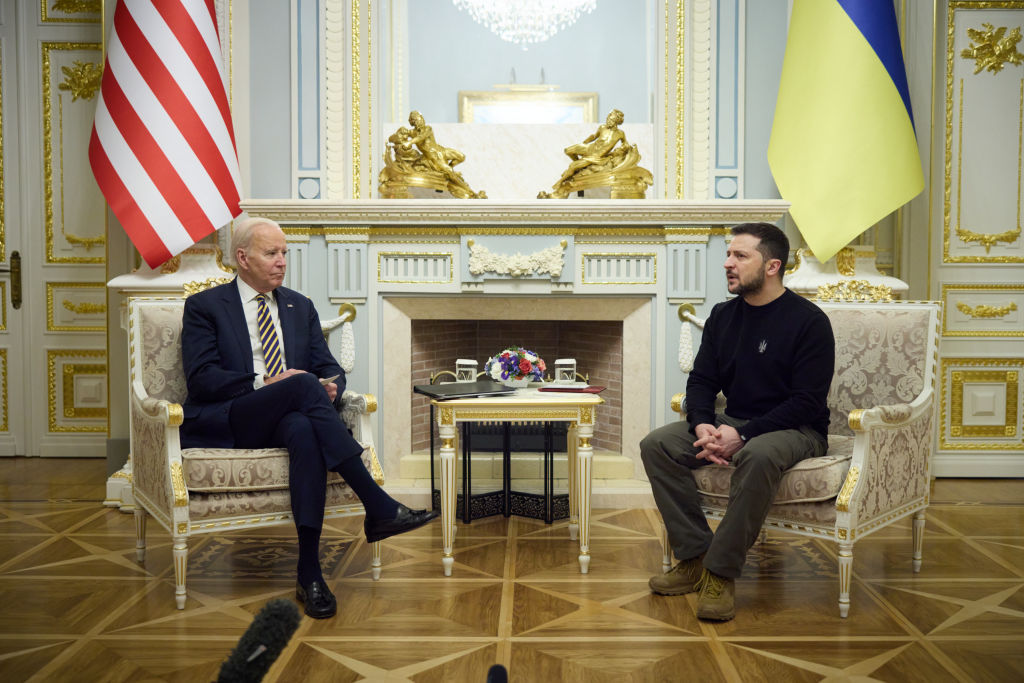The Biden administration on Friday announced plans to provide cluster munitions for Ukraine as changing battlefield conditions prompted yet another reversal over sending weapons once deemed too sensitive.
Kyiv has requested the weapon, essentially a bomb filled with mini “bomblets,” for months to target deeply entrenched Russian positions and prosecute the counteroffensive despite its disadvantage in troop numbers and ammunition, according to The New York Times. While the Biden administration initially demurred regarding Ukraine’s demands for the controversial weapon, which poses a unique risk to civilians, officials signaled in recent weeks the White House was coming around to Kyiv’s line of reasoning.
Laura Cooper, deputy assistant secretary of defense for Russia, Ukraine and Eurasia, told Congress in late June the administration determined cluster munitions would offer Ukraine an advantage “especially against dug-in Russian positions on the battlefield.”
A new aid package revealed Friday includes “highly effective and reliable” munitions approved after extensive consultations with Congress and Allies, the Department of Defense said in a statement.
The U.S. maintains large stockpiles of dual-purpose improved conventional munitions (DPICMs), the official name of cluster bombs, going back to the Korean war.
Those delivered to Ukraine “will consist only of those with a dud rate of less than 2.35%,” Undersecretary of Defense for Policy Colin Kahl told reporters Friday. In contrast, Russia has been using DPICMs that fail 30 to 40% of the time.
More than 100 countries have banned cluster munitions due to their high fail rate, the highest among all varieties of weapons, according to the NYT. The projectiles burst in mid-air and disseminate smaller munitions over a large target area, but up to a fifth of the bomblets fail to detonate upon impact.
Unexploded ordnance can then detonate weeks or even years later when disturbed, injuring and killing civilians, according to the NYT. Between 56,500 and 86,500 civilians have died from late-detonating cluster bombs since World War II.
However, launching cluster bombs is not a war crime itself, and neither the U.S. nor Ukraine nor Russia is party to the 2008 Convention on Cluster Munitions that banned producing, stockpiling, use or transfer of the weapons, the NYT reported.
Russia has already used cluster bombs to devastating effect as Moscow attempts to capture more Ukrainian territory, and there are reports that Ukraine has used them during counteroffensives to retake occupied lands, according to the NYT. An April 2022 strike on a crowded train station in the Ukrainian city of Kramatorsk killed dozens and injured more than 100 people, primarily civilians, marking the deadliest use of cluster munitions during the war.
Ukraine has promised to deploy the munitions with care given that they will be used on Ukrainian territory, Kahl said.
The change comes as Ukraine’s summer counteroffensive, now several weeks in, has produced little in the way of major advances, CNN reported on June 30. Russian forces had months to prepare for the publicly-anticipated counteroffensive, digging miles of fortified trenches with tank traps and mines along the front, the NYT reported.
U.S. officials said Russia’s defense lines proved more durable than anticipated, and Ukraine may be expending ammunition faster than it can be replaced if the counteroffensive lasts longer than planned, according to CNN.
The new capability “will eliminate much of the time pressure by opening up a large tranche of ammunition to keep the offensive going,” Michael Kofman, director of the Russia Studies Program at CNA, told the Financial Times. Such munitions will prove “far more significant” than other recently acquired western weapons, he added.
The White House and National Security Council did not immediately respond to the Daily Caller News Foundation’s requests for comment.
All content created by the Daily Caller News Foundation, an independent and nonpartisan newswire service, is available without charge to any legitimate news publisher that can provide a large audience. All republished articles must include our logo, our reporter’s byline and their DCNF affiliation. For any questions about our guidelines or partnering with us, please contact [email protected].
All content created by the Daily Caller News Foundation, an independent and nonpartisan newswire service, is available without charge to any legitimate news publisher that can provide a large audience. All republished articles must include our logo, our reporter’s byline and their DCNF affiliation. For any questions about our guidelines or partnering with us, please contact [email protected].


























 Continue with Google
Continue with Google